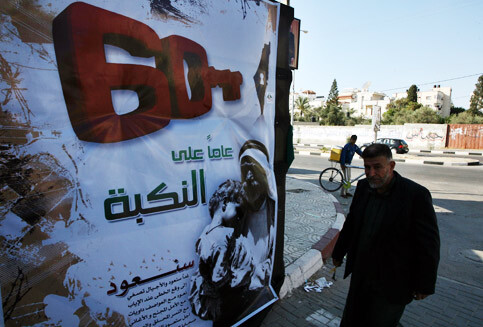Palestine 17 June 2008

A Palestinian man walks past a poster in Gaza City for the 60th anniversary of the Nakba, May 2008. (Wissam Nassar/MaanImages)
I’ve been thinking about the urgency of 1948. One of the most repeated quotes among Palestinian refugees is: “The old will die and the young will forget,” words reputedly spoken by Israel’s founding prime minister David Ben-Gurion. However, the young have not forgotten. Everywhere I have traveled in the Arab world — Palestine, Jordan, Lebanon, and Syria — Palestinian children tell me the names of their original villages that they still hope to see someday. Even the youngest of children will say things like, “If I don’t return to my village, then my children or their children will.”
Perhaps this is the nature of displacement, that the desire to return is compounded as long as the right to return is denied. But how to explain the urgency? Those who were young at the time of the Nakba, 60 years ago, are dying. Just as the Holocaust generation of Jews is slowly passing away, so is the Nakba generation of Palestinians. The difference is in the collective world memory of each tragedy. The Nazi Holocaust is denied by very few today (and even fewer with any kind of world power), whereas the Nakba continues to be denied by the powerful, as it has been for 60 years. Each time I visit with Nakba survivors who currently live inside ‘48 (Israel) and have Israeli citizenship, I am astounded that the desperation in their voices far exceeds most of what I hear from Palestinians in the West Bank (Gaza, currently, is another story). Why is this? In all superficial ways, Palestinians with Israeli citizenship have a better standard of life than those in the West Bank. West Bank Palestinians, however, while continuously besieged and attacked, rarely find themselves face to face in conversation with people who deny their identities, their histories, and their experiences. Palestinians with Israeli citizenship face this every day.
We visited last week with a man who lives just a few miles from his original village. He showed us a map the survivors have made in Hebrew with each person’s name and house and land marked. “We were here,” he kept saying, “and we farmed, and we went to school, and we had a bus station, and we owned land. We were here. This is my father’s name. We were here.” He kept offering tidbits of proof, as though he expected us to doubt his story.
When he took us to the land, as he has so many times before, I couldn’t help but think about the number of Israelis, foreigners, and perhaps even Palestinians who drive by there each day without realizing there was ever anything there before the Jewish National Fund planted a pine forest. The remains of houses can easily be mistaken for stone paths. Not one house remains, but that doesn’t stop our guide from taking us to a spot on the land that to me looks like any other, and saying, “Welcome to my home. Someday you will come back here and visit me in my rebuilt house and I will serve you tea.”
The urgency is in the living memory, the denied reality, the willful invisibility. The Nakba is not something that happened 60 years ago. It is a process that continues to this day, and it is a process that can and must end if we are ever to see a true solution for the people of this land.
Hannah Mermelstein is co-founder and co-director of Birthright Unplugged, which takes mostly Jewish North American people into the West Bank to meet with Palestinian people and to equip them to return to their own communities and work for justice; and takes Palestinian children from refugee camps to Jerusalem, the sea, and the villages their grandparents fled in 1948, and supports them to document their experiences and create photography exhibits to share with their communities and with the world.




